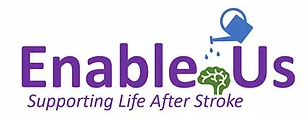National and International Resources
On this page, you will find a wide range of national and international resources, including organizations dedicated to helping stroke survivors and caregivers as well as current evidence-based research and clinical trials.
American Resources

The American Stroke Association (ASA) is a great resource where you can find information about a wide range of topics such as :
- Symptoms, types, risk factors, and effects of stroke
- How to recover after a stroke including how you can prevent another one and changes you can make in your daily life
- Support for both survivors and caregivers including financial resources and finding support groups in your own area
- Tips for a healthy lifestyle focusing on brain health, eating, fitness, and more
- The stroke resources library that has a variety of educational materials
- Ways you can get involved in different events and fundraising opportunities

The American Stroke Foundation is an organization that focuses on helping stroke survivors and caregivers improve their quality of life.
- At the top of the main webpage, click on the "Life After Stroke" tab to find guides and resources that include caregiver resources, brain games, and information related to education, exercise, life skills, and wellness.
- This organization also created the "Next Step Program" which highlights the areas of communication, health behaviors, life after stroke, and physical fitness with activities focused on improving health and wellness. To find out more, click on the "Next Step" tab at the top of the main webpage.

The National Aphasia Association (NAA) provides resources for people who experience aphasia. Aphasia is common after a stroke and can affect one's ability to speak and understand others. This website offers:
- Information about aphasia and the different types
- A caregiver support guide
- Helpful materials including apps, assistive technology, communication guides, and fact sheets
- Links to other related organizations and resources
International Resources

Enable Us provides resources for both stroke survivors and caregivers including :
- Enabling the Next Step Forward Program: A free, 5-part webinar series designed for survivors and caregivers focusing on topics such as physical and emotional well-being.
- Virtual support groups that include survivors from outside of the US
- Stories from stroke survivors
- Podcasts: https://www.enable4us.com/post/know-stroke-podcast-launches

The Heart and Stroke Foundation Canadian Partnership for Stroke Recovery includes partners from across Canada and around the world dedicated to stroke recovery research.
- At the top of the main webpage, click on the "Research" tab for more information related to research funding and current clinical trials.
- For clinicians: Click on the "Tools and Resources" tab and click on "clinicians" to find links to further evidence-based research and professional development resources.
- For patients and families: Click on the "Tools and Resources" tab and click on "patients" for links to a wide range of resource sheets and guides and videos about different topics.

The Stroke Alliance for Europe (SAFE) represents a wide range of over 35 stroke support groups from across Europe and helps to raise awareness about stroke. Their website features:
- An introduction to what a stroke is and how it occurs
- Information about living with stroke, including tips for how friends and family can provide support and what rehabilitation may look like
- Stories from stroke survivors
- A "Life After Stroke" forum with webinar series about different topics

Stroke Engine is an international tool that includes evidence-based research for both clinicians and patients and families.
- For stroke patients and families, there is information available about:
- Common effects and difficulties after a stroke and why they occur
- Evidence-based interventions included in stroke rehabilitation: To find this information, go to https://strokengine.ca/en/interventions/ and follow these steps:
1. Click on the intervention you want to learn more about. They are in alphabetical order.
2. On the left side of the page, click on "Patient/Family Information."
- Where to find further resources and support
- For clinicians: Evidence-based assessments, interventions, and research

The Stroke Network is an online stroke support and resource group for both survivors and caregivers from all over the world.
- Caregivers and survivors can join forums and chat rooms to talk with others from around the world at any time and stroke support groups are available 24/7!
- Explore the website to find more informational resources and find out how you can get involved!
The World Stroke Organization (WSO) focuses on raising awareness of prevention and treatment of stroke.
- Members include a wide range of healthcare professionals, researchers, stroke societies, patient stroke support organizations, caregivers, and stroke survivors from all over the world.
- Patient and caregiver resources are available. To find these, follow these steps:
- On the main page of the WSO website, click on the green button that says "Im a patient or carer."
- Scroll down and find the box that says "Stroke awareness." Click on the button that says "Find out more"
- This will bring you to another page with topics including: Learn about stroke, stroke prevention, stroke treatment, and life after stroke.
- Click on the "find out more" button under any of these topics to explore the resources and information available!
Resources for Clinical Trials

- Learn more about current research being done across Canada related to stroke recovery!

- In the search box, type in "stroke" or any topic related to stroke to explore current European clinical trials that are being conducted or have results already published.

The NIH StrokeNet Clinical Trials include upcoming and ongoing stroke prevention, acute intervention, and recovery trials. Click on the link to learn more about current clinical trials in the US!
